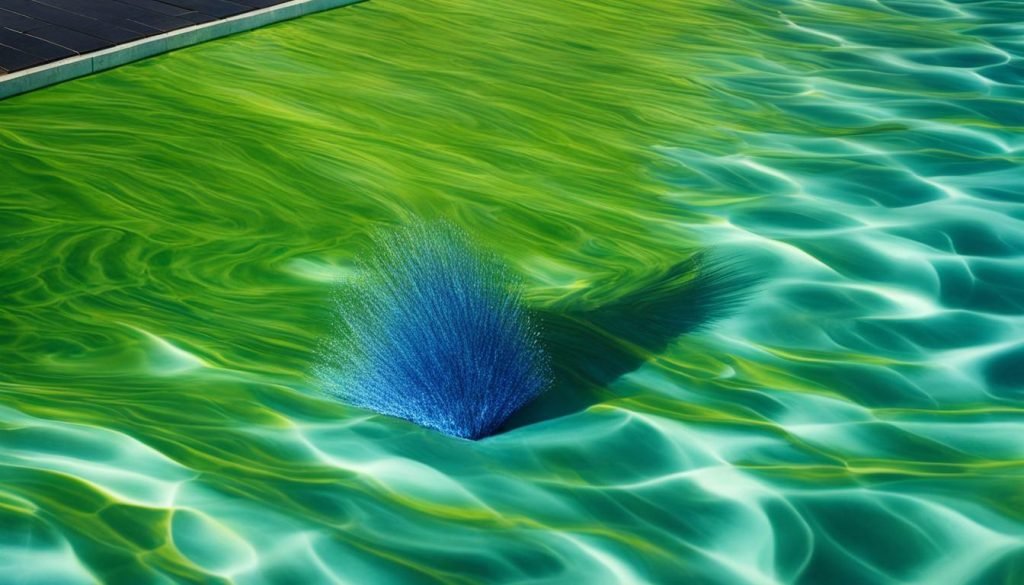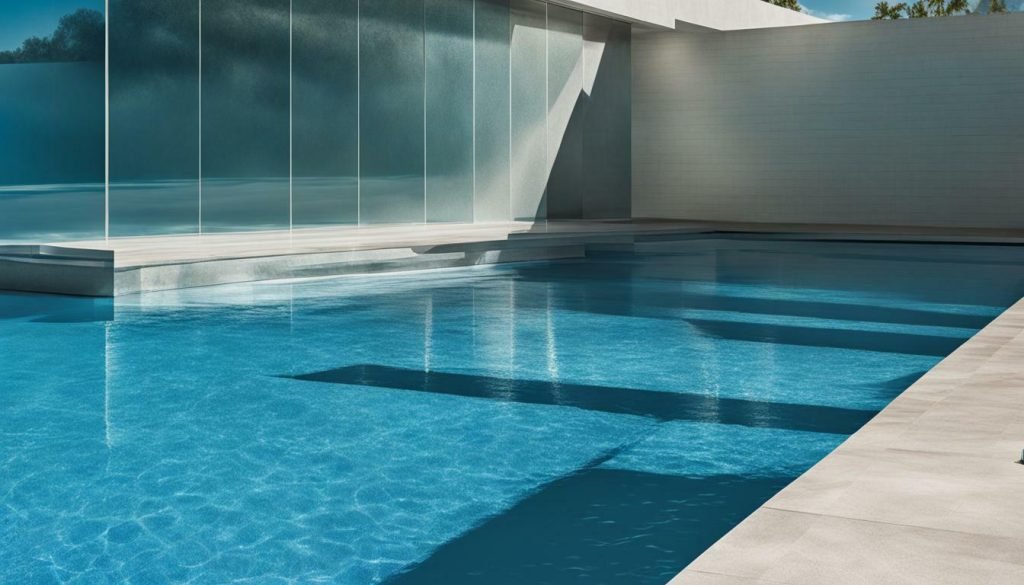Keeping your pool walls and floor clean is essential for maintaining a pristine swimming pool. Regular brushing of the pool walls and floor helps remove algae and dirt buildup, ensuring a clean and sparkling pool for maximum enjoyment. In addition to brushing, investing in a durable pool cover and regularly skimming the water’s surface with a net can prevent debris accumulation, keeping your pool looking its best.
Key Takeaways:
- Regularly brushing the pool walls and floor helps remove algae and dirt buildup.
- Invest in a durable pool cover to prevent debris accumulation.
- Use non-abrasive cleaning tools and pool-friendly cleaning products to avoid damaging the pool surface.
- Maintain proper water chemistry by regularly testing and adjusting chlorine levels, pH levels, and overall alkalinity.
- Clean or backwash the pool’s filter regularly to ensure optimal functioning and reduce strain on the circulation system.
The Importance of Brushing Pool Walls and Floor
Properly brushing your pool walls and floor is vital to prevent algae growth and maintain a visually appealing and safe swimming environment. Regular brushing helps to remove algae and dirt buildup, ensuring that your pool remains clean and inviting. Neglecting to brush the pool walls and floor can lead to the accumulation of debris and create a breeding ground for bacteria, compromising water quality and potentially causing health issues for swimmers.
By regularly brushing your pool, you not only enhance its aesthetic appeal but also prolong its lifespan. Algae and dirt buildup can cause irreversible damage to the pool surface, leading to costly repairs or even requiring the replacement of the entire pool structure. Brushing prevents these issues by eliminating potential contaminants and preserving the integrity of the pool’s walls and floor.
To effectively brush your pool, use a soft-bristle pool brush that will not damage the surface. Gentle yet thorough motions are key to ensure that you reach all areas, including corners and steps. Pay close attention to areas prone to algae growth, such as shaded spots and where the water circulation may be limited. By dedicating just a few minutes to brushing your pool on a regular basis, you can enjoy a sparkling clean pool that is ready for swimming whenever you desire.

Remember, brushing is just one aspect of pool maintenance. It is important to use non-abrasive cleaning tools and pool-friendly cleaning products to avoid damaging the pool surface. Additionally, maintaining proper water chemistry through regular testing and adjustments is crucial. Don’t forget to clean or backwash the pool’s filter regularly to ensure optimal functioning and reduce strain on the circulation system. By incorporating these practices into your pool cleaning routine, you can keep your pool in excellent condition and enjoy a refreshing swim whenever you desire.
| Pool Maintenance Tips for Brushing Walls and Floor |
|---|
| Invest in a durable pool cover to prevent debris accumulation. |
| Regularly skim the surface of the water with a net to remove leaves and insects. |
| Use a soft-bristle pool brush to effectively remove algae and dirt buildup. |
| Use non-abrasive cleaning tools and pool-friendly cleaning products to avoid damaging the pool surface. |
| Maintain proper water chemistry by regularly testing and adjusting chlorine levels, pH levels, and overall alkalinity. |
| Clean or backwash the pool’s filter regularly to ensure optimal functioning. |
| Run the filter system once a day for a duration based on the pool volume and filtration rate. |
| Consider professional pool cleaning services for expert pool wall and floor brushing. |
Techniques for Effective Pool Wall and Floor Brushing
To get the best results when brushing your pool walls and floor, follow these simple yet effective techniques. Start by investing in a soft-bristle pool brush, as this will ensure gentle yet thorough cleaning without damaging the pool surface. Begin by brushing the walls, starting from the top and working your way down. Use long, sweeping motions to remove any dirt or algae buildup. Next, focus on the pool floor, using the same long, sweeping motions to remove any debris. For even more effective cleaning, consider incorporating simple pool vacuuming techniques to ensure that all dirt and debris is removed from the pool surface. By combining these methods, you can keep your pool looking clean and inviting for all of your swimmers. Finally, don’t forget to regularly test and adjust the pH levels of your pool water. Maintaining the proper pH balance is essential for keeping the water safe and comfortable for swimming. Consider mastering pH level testing to ensure that your pool water is always at the optimal levels for cleanliness and clarity. With these simple techniques and regular maintenance, you can enjoy a sparkling clean pool all season long.
Next, focus on the pool floor. Brush in overlapping patterns, moving from one end to the other. Pay extra attention to areas with high foot traffic or prone to debris accumulation. Regular brushing will prevent the buildup of algae and dirt, keeping your pool clean and inviting.
Remember to brush all the nooks and crannies of your pool, including steps and corners. These areas are often overlooked but can harbor algae and dirt. Make sure to use a gentle yet firm pressure to effectively remove any stubborn debris.
Table 1: Recommended Pool Brushing Techniques
| Step | Technique |
|---|---|
| 1 | Brush the pool walls from the top down, using long, sweeping motions. |
| 2 | Brush the pool floor in overlapping patterns, focusing on high-traffic areas. |
| 3 | Pay attention to corners and steps, using a gentle yet firm pressure to remove debris. |
Regularly brushing your pool walls and floor is essential for maintaining a clean and hygienic swimming environment. By following these techniques, you can effortlessly remove algae and dirt buildup, ensuring maximum enjoyment of your pool.

Pool Maintenance Tips for Brushing Walls and Floor
In addition to brushing, there are several other pool maintenance tips that can ensure the walls and floor of your pool remain clean and free from debris. Investing in a durable pool cover is highly recommended as it prevents the accumulation of leaves, insects, and other debris, keeping your pool cleaner for longer periods. Regularly skimming the surface of the water with a net is also an effective way to remove leaves and insects that may have entered the pool.
When it comes to brushing the walls and floor of your pool, it is important to use the right tools to avoid damaging the pool surface. A soft-bristle pool brush is ideal for this task. Make sure to use gentle yet thorough motions to effectively remove algae and dirt buildup. Remember to brush all areas, including corners and steps, to achieve a thorough clean.
Maintaining proper water chemistry is crucial for a clean and safe pool. Regularly test and adjust chlorine levels, pH levels, and overall alkalinity to ensure optimal water quality. This will not only help prevent algae growth but also keep the pool water balanced and swimmable.
Another essential aspect of pool maintenance is cleaning or backwashing the pool’s filter. This ensures the filter functions effectively, removing impurities from the water. Running the filter system for an appropriate duration based on your pool volume and filtration rate is recommended. Additionally, scheduling periodic professional inspections will help identify and address any potential issues before they escalate, ensuring your pool remains in top condition.
Pool Maintenance Tips in Summary:
- Invest in a durable pool cover to prevent debris accumulation.
- Regularly skim the surface of the water with a net to remove leaves and insects.
- Use a soft-bristle pool brush and gentle motions to effectively brush the walls and floor.
- Maintain proper water chemistry by testing and adjusting chlorine levels, pH levels, and overall alkalinity.
- Clean or backwash the pool’s filter to ensure optimal functioning.
- Run the filter system daily for an appropriate duration based on pool volume and filtration rate.
- Schedule professional inspections to identify and address potential issues.
By incorporating these pool maintenance tips into your regular cleaning routine, you can enjoy a clean and safe swimming pool all year round.

Professional Pool Wall and Floor Brushing Services
If you prefer to leave the task to the experts, professional pool wall and floor brushing services provide a convenient and reliable solution. These services specialize in maintaining the cleanliness and hygiene of your pool, ensuring it remains in top condition for you to enjoy.
By hiring professional pool cleaning services, you can save time and effort while ensuring that your pool walls and floor are expertly brushed. These professionals have the knowledge, experience, and specialized tools to effectively remove algae and dirt buildup, leaving your pool sparkling clean.
Additionally, professional pool wall and floor brushing services offer regular inspections to identify and address any potential issues before they escalate. This proactive approach helps maintain the longevity of your pool and keeps it in optimal working condition.
| Benefits of Professional Pool Wall and Floor Brushing Services: |
|---|
| 1. Expert knowledge and experience in pool maintenance |
| 2. Thorough removal of algae and dirt buildup |
| 3. Regular inspections to address potential issues |
| 4. Time and effort-saving solution |
Investing in professional pool wall and floor brushing services ensures that your pool remains clean, safe, and ready for use whenever you desire. It takes the hassle out of pool maintenance, allowing you to have more time to relax and enjoy your swimming experience.

Conclusion
Regularly brushing the walls and floor of your pool is an essential part of pool maintenance, ensuring a pristine and inviting swimming environment. By investing in a durable pool cover, you can prevent debris accumulation and minimize the time and effort required for cleaning. To keep the surface of the water free from leaves and insects, make sure to regularly skim it with a net.
When it comes to brushing the pool walls and floor, using a soft-bristle pool brush is key. This gentle yet effective tool helps remove algae and dirt buildup without causing damage to the pool surface. Remember to use non-abrasive cleaning tools and pool-friendly cleaning products to maintain the integrity of your pool.
Maintaining proper water chemistry is crucial for a clean and safe swimming experience. Regularly test and adjust chlorine levels, pH levels, and overall alkalinity to ensure optimal water conditions. Additionally, cleaning or backwashing the pool’s filter helps maintain its efficiency and reduces strain on the circulation system. For best results, run the filter system for a duration based on your pool’s volume and filtration rate.
While regular maintenance is important, professional inspections can provide an added layer of expertise. These inspections can help identify and address potential issues before they escalate, ensuring the long-term health and functionality of your pool. By creating a pool cleaning schedule and incorporating pool maintenance into your regular cleaning routines, you can enjoy a clean and safe swimming environment all year round.
What Are the Best Techniques for Brushing the Pool Walls and Floor?
When it comes to maintaining a clean pool, using the top pool cleaning tips for brushing the walls and floor is essential. Start by brushing from top to bottom using a pool brush, focusing on areas with algae or dirt buildup. Be sure to also brush along the waterline to prevent unsightly staining.
FAQ
What is the best way to clean and maintain a pool?
To effortlessly clean and maintain a pool, it is recommended to invest in a durable pool cover to prevent debris accumulation. Regularly skimming the surface of the water with a net can also help remove leaves and insects. Brushing the walls and floor of the pool helps remove algae and dirt buildup, using a soft-bristle pool brush. It is important to use non-abrasive cleaning tools and pool-friendly cleaning products to avoid damaging the pool surface. Maintaining proper water chemistry by regularly testing and adjusting chlorine levels, pH levels, and overall alkalinity is crucial. Cleaning or backwashing the pool’s filter ensures optimal functioning and reduces strain on the circulation system. It is recommended to run the filter system once a day for a duration based on the pool volume and filtration rate. Professional inspections can help identify and address potential issues before they escalate. Creating a pool cleaning schedule and incorporating pool maintenance into regular cleaning routines can help ensure a clean and safe pool.
How often should I brush the pool walls and floor?
It is recommended to brush the pool walls and floor at least once a week, or more frequently if needed. Regular brushing helps prevent algae and dirt buildup, ensuring a clean and hygienic swimming environment.
What tools should I use for brushing the pool walls and floor?
For effective pool wall and floor brushing, use a soft-bristle pool brush. Avoid using abrasive brushes or tools that can damage the pool surface. Additionally, consider investing in a telescopic pole to reach all areas of the pool easily.
Can I use any cleaning products to brush the pool walls and floor?
It is essential to use pool-friendly cleaning products when brushing the pool walls and floor. Avoid using harsh chemicals or household cleaners as they can damage the pool surface and affect water chemistry. Opt for specifically formulated pool cleaning solutions that are safe and effective.
Should I hire professional pool cleaning services for wall and floor brushing?
Hiring professional pool cleaning services can be beneficial for efficient and expert pool wall and floor brushing. Professionals have the knowledge and experience to handle pool maintenance tasks effectively, ensuring a clean and well-maintained pool. They can also conduct regular inspections to identify and address any potential issues.
How do I create a pool cleaning schedule?
Creating a pool cleaning schedule involves determining the frequency of various maintenance tasks, such as skimming, brushing, and checking water chemistry. Take into account factors like pool usage, weather conditions, and the presence of trees or other debris sources. Incorporate pool maintenance into your regular cleaning routines, ensuring that each task is performed consistently and on schedule.
